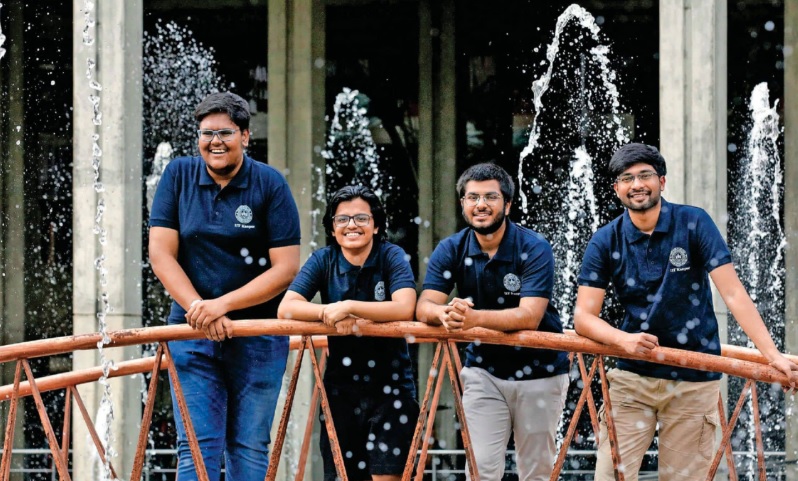Versuchen GOLD - Frei
ENGINEERING MARVEL
THE WEEK India
|June 30, 2024
IIT Kanpur is taking innovation to new heights and frontiers. Here, medicine meets engineering meets finance....

Imagination can run wild in a classroom, but it finds wings at the flight laboratory of the Indian Institute of Technology Kanpur. Inside, half a dozen training aircraft are parked in the hangar. Apart from an airstrip, IIT Kanpur boasts three helipads, too. No other institute boasts such a facility, says Prof G.M. Kamath, head of the department of aerospace engineering, IIT Kanpur. Thanks to the lab, students here get hands-on training.
"We get pilots to fly these aircraft. It benefits students as they can do experiments based on the manoeuvres," says Kamath. "This helps the students get a feel of the aircraft and helps them design better aircraft."
The flight laboratory runs courses in flight testing, wherein students collect, analyse and evaluate performance and handling qualities of the airplanes. And so, students from across the country-from the Punjab Engineering College (PEC) Chandigarh to IIT Bombay, IIT Kharagpur, IIT Madras and the Madras Institute of Technology-flock to the lab. A few years ago, students from the Nanyang Technological University Singapore also visited the lab.
"Close to 300 students from outside come here every year for a 10-day course," says Kamath.
The flight lab is closely monitored, audited and certified by the Directorate General of Civil Aviation. On prominent display is the HANSA-3, the first indigenously produced composite aircraft in India. Designed by the National Aerospace Laboratories in Bengaluru, the aircraft carries fibre optic sensors developed by IIT Kanpur's aerospace engineering department. The sensors-each as thin as a hair strand-help monitor the structural health of the aircraft for five to 10 years.
"One can monitor whether the aircraft went through some kind of turbulence or if it had a hard landing," explains Kamath. "Each and every aspect of the flight can be monitored."
Diese Geschichte stammt aus der June 30, 2024-Ausgabe von THE WEEK India.
Abonnieren Sie Magzter GOLD, um auf Tausende kuratierter Premium-Geschichten und über 9.000 Zeitschriften und Zeitungen zuzugreifen.
Sie sind bereits Abonnent? Anmelden
WEITERE GESCHICHTEN VON THE WEEK India

THE WEEK India
A KNIGHT TO REMEMBER
How the latest Game of Thrones prequel saved the franchise
4 mins
March 08, 2026

THE WEEK India
CURRENTS OF CHANGE
Kayakers on the Tawangchu river are transforming a frontier district
3 mins
March 08, 2026

THE WEEK India
Himalayan challenge
The upcoming parliamentary elections is a referendum on governance, institutional integrity and public trust
5 mins
March 08, 2026

THE WEEK India
Third Mumbai will be much bigger than what Mumbai is now
THE DIFFERENCE BETWEEN MUMBAI AND NAVI MUMBAI IS THAT NAVI MUMBAI IS PLANNED, AND HAS MORE OPEN SPACE, PLAY AREAS AND GREENERY. THIRD MUMBAI WILL BE BIGGER AND BETTER.
3 mins
March 08, 2026

THE WEEK India
AI dreams and blocked pipes
I can't see the clogged toilet pipes of the world's most expensive and advanced aircraft carrier, the USS Gerald R. Ford, currently stationed in the eastern Mediterranean on a mission to punish Iran into abject surrender, as anything but symbolic.
2 mins
March 08, 2026
THE WEEK India
Rejoinder to the column by Mahua Moitra
This is with reference to Ms Mahua Moitra's column, 'Hard questions for Hardeep' (March 1, 2026). The column dresses up insinuation as accountability, builds its narrative on inflated arithmetic, and invites the reader to mistake volume and vocabulary for evidence. The record does not support her leaps. But before we examine the substance of what she claims, the reader is entitled to consider who is making the claim—because the messenger, in this case, is the message.
8 mins
March 08, 2026

THE WEEK India
Open AI sesame
India needs more than a summit to open the doors to AI glory
5 mins
March 08, 2026

THE WEEK India
A global invocation
Auroville and Puducherry hosting Global Spirituality Mahotsav 2026
3 mins
March 08, 2026

THE WEEK India
Power of resistance
A durable democracy in Bangladesh needs an empowered, institutional and responsible opposition
2 mins
March 08, 2026

THE WEEK India
The pause that matters
In many parts of the world, including India, a quiet but pivotal shift is unfolding. Women are living longer, fuller lives, and daughters are outpacing their mothers in education, careers and ambition. Even so, one of the most important transitions in a woman's health journey is only now receiving the attention it deserves. Menopause is increasingly being understood not as an ending to be endured, but as a turning point shaping long-term health and vitality.
2 mins
March 08, 2026
Listen
Translate
Change font size

